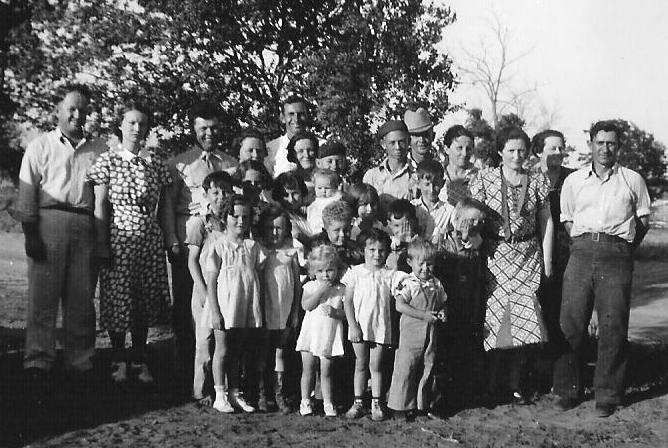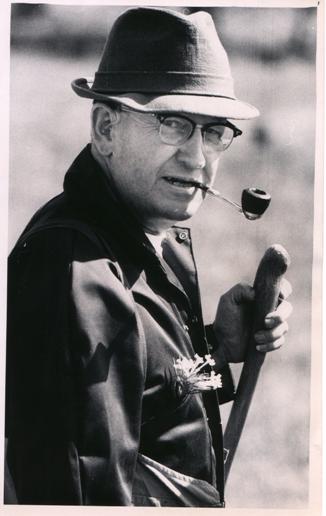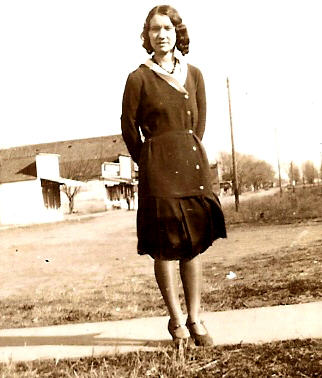|
|
You’ll never have a better opportunity to gather anecdotal stories about family history – especially recent history – and to add to the family’s precious collection of photographs. Or to update your information on your family as it is right now – data that becomes the heart of family histories in the future. The Saturday after Thanksgiving at our house we invited over all of the next generation, and the one after that, who could attend – a total in our small local branch of the Blairs of nine adults and ten children, from three generations. In our modest and furniture-crowded house it was delicious bedlam for four hours. Confronted with more small children than they had ever seen in their sheltered lives, our three cats reacted with understandable anxiety. Georgie hid out in the bedroom all evening; Zander darted from behind one piece of furniture to behind another; and Gracie climbed into my lap and snuggled close for security. A couple of times I almost sympathized, as the house reverberated with the joyous shrieks of a generation of children who definitely haven’t been raised to be seen, not heard. But we loved it. Such a life-affirming experience for a couple who spend way too much time by ourselves or with other old folk! The star of the show was our new grandniece, T.R. Her momma felt comfortable enough to let several others hold T.R., including our six-year-old granddaughter -- who looked like T.R. was far, far better than a dolly. T.R. is the latest in a line of new babies introduced at these reunions, and possibly the last, as the family roster appears to be pretty much filled up by now. After the pizza had been delivered and consumed, the story telling, which had already started, got into full gear. And cameras were flashing like a convention of paparazzi at a movie premier. Two of the most important activities at a family reunion these, as I mentioned earlier. And it doesn’t even matter if most of the stories have been told before, often several times. This is a form of oral lore that’s been practiced by humans for millennia. Find stories to tell, then tell them repeatedly to younger generations to keep memories alive. As I’ve related in past columns, my family has some stories that have been passed down in this way for more than 150 years. Whether they are strictly factual or not, they have achieved the status of being “true” for our family. And their details have led me more than once to uncovering documentable family history by pointing the way to where to look and what to look for. Of course the really old stories are obviously treasures. Great-great Grandma Catharine hired by the Indians as a midwife; Great-Grandpa Walkup and his purchase of 40 horses as traveling capital for a move to Oklahoma Territory and him feeding them free in a farmer’s field that they “accidentally” got into along the road. Lately I’ve added a couple more tales from my gleanings in genealogy – the four orphans from Cornwall, the inheritance and the bunion joint; Captain Piggott and the ferryboat; Daniel Boone adopted by the Shawnee. What’s important to listen for in tales told at modern family reunions is relatively new stories that have the makings of timeless family lore. Today one of my nephews related the story of my father, dressed in a Tyrolean hat and a windbreaker and wielding a hand-carved walking stick, leading a group of people on a trek along the route of the old Santa Fe Trail through a small portion of the Kansas Flint Hills grasslands. He’d had his picture taken by a press photographer along for the walk. The photo, and the story, not only show Dad at a time when he was still in his prime, but also capture a bit of his character as a knowledgeable leader who worked with a Boy Scout troop for years in an unofficial capacity as “expert” on field lore such as how to cook over a campfire, how to identify trees and birds and animals, how to make a whistle from a willow branch. Now his grandchildren have that story, and are telling it to his great-grandchildren, keeping a bit of him alive in memories.
I especially like the stories that have one or more photographs or physical items associated with them. The combination of words and images really brings people to life. But my point is, somebody at every family reunion . . . and it might as well be you . . . should preserve these old stories in a more retrievable format than somebody’s memory. For example, if my Great-Aunt Lee hadn’t told the story of Walkup and his horses, and the story of Catharine and her work with the Indians, at a family reunion and her daughter written it down on the spot, then transcribed it into a document that she then shared with other family members, both stories would almost certainly have been lost by now. You don’t have to be a skilled writer to do this – just try to copy down the story as closely as possible to how it’s told. Use a recording device if possible, so you can transcribe at leisure. Get permission to record of course, but don’t stick a microphone in your source’s face – that can put some people off, make them nervous. With modern equipment, small and unobtrusive, that has become much easier. And if you think it’s appropriate, take photos of the storyteller – I’d love to have one of Great Aunt Lee telling her stories. Of course the traditional way to preserve these is in pamphlet format, easy to do with modern computers and printers. The more adventurous might want to make home videos as well, but these are a bit harder to share and more perishable. And be sure to ask for permission to share photos and videos (and in some cases names). Here’s a little bit of family lore I just heard from my 98-year-old Aunt Mary and shared at our latest reunion, now written down for the first time: When my mother turned 21 and was eligible to vote, it was 1930. Women had only had the right to vote since 1920. Her father encouraged her to exercise her right, and even gave her a list of candidates running in the election, but she noticed that it had only the names of the Democrats. When she asked who was running on the Republican ticket, Grandpa said “Oh, they’re not worth bothering about.”
In our historically Republican family (which includes a few Democrat nonconformists like me) that’s an especially funny – and telling – story, which reveals something about history in general, family history and Grandpa Percy in particular. It’s well worth recording and preserving. (Mom voted Republican pretty much the rest of her life, by the way.) Click on author's byline for bio and list of other works published by Pencil Stubs Online.
|






